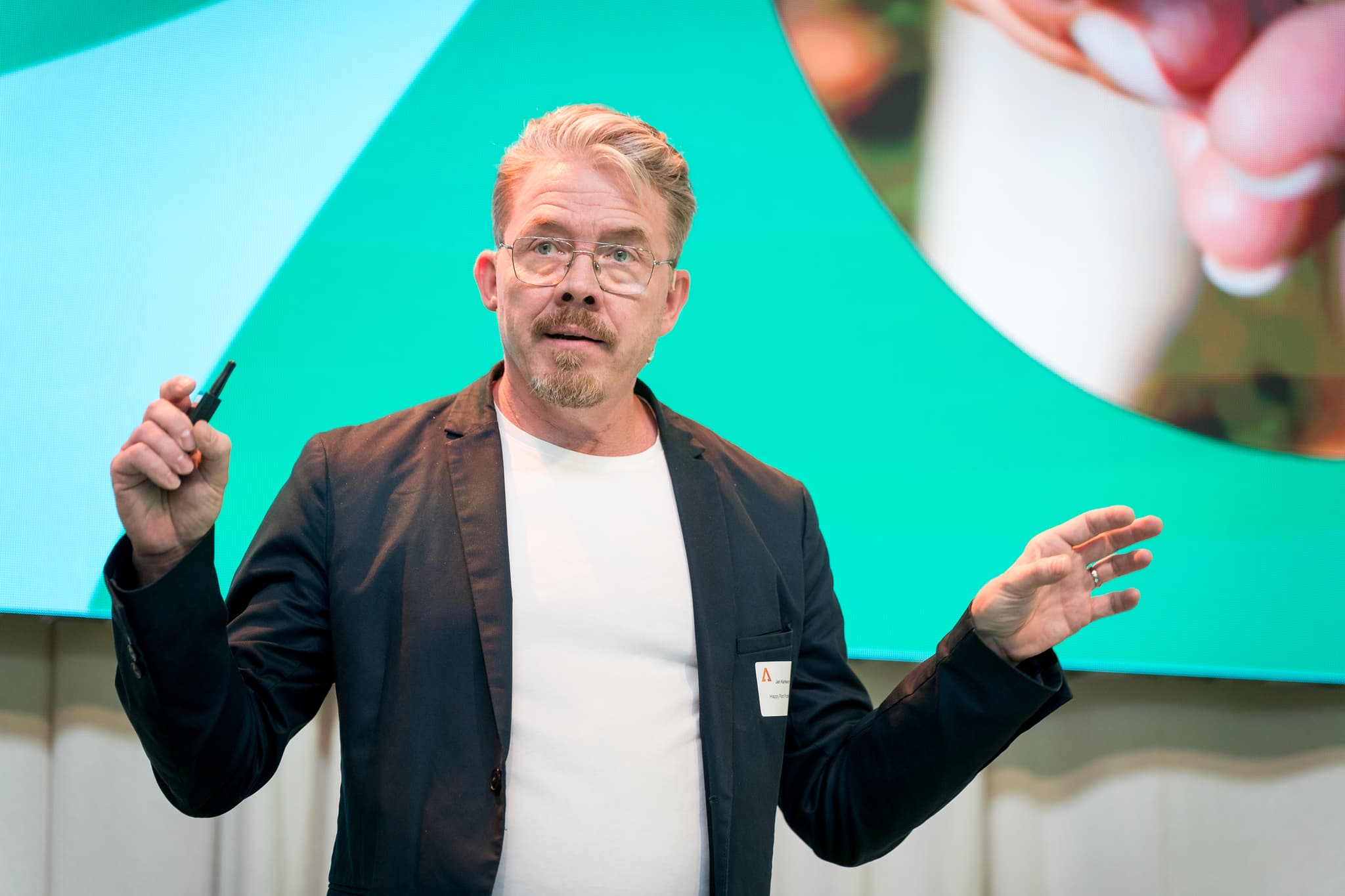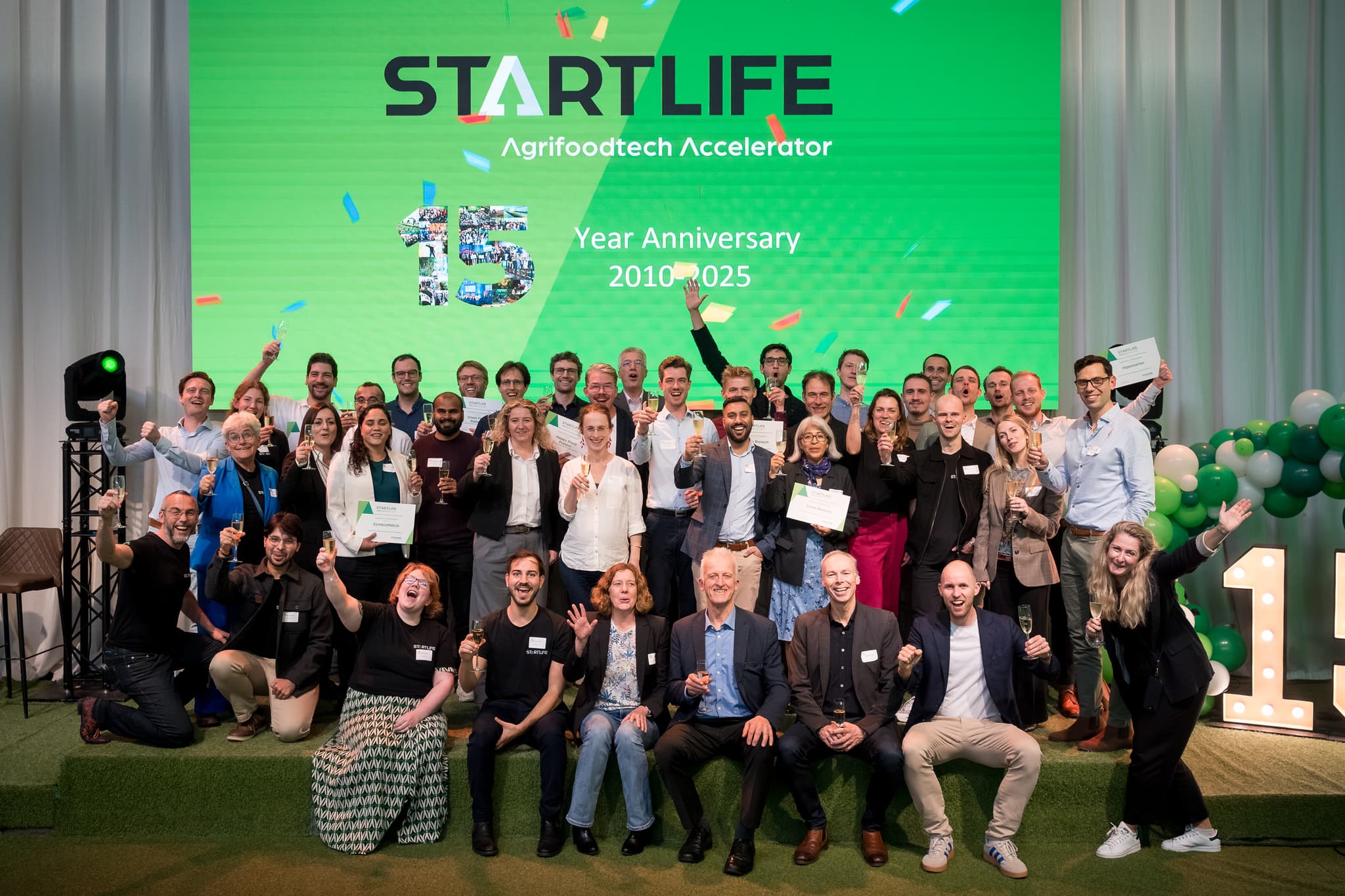Happy Plant Protein: Turning local flour into global opportunity
This Finnish startup’s one-step technology transforms ordinary flour into high-quality plant protein, decentralizing the future of food.
Published on November 7, 2025

Happy Plant Protein
Bart, co-founder of Media52 and Professor of Journalism oversees IO+, events, and Laio. A journalist at heart, he keeps writing as many stories as possible.
At StartLife’s 15th anniversary celebration in Ede, eleven pioneering agrifoodtech startups took the stage to show how science and entrepreneurship can reshape the future of food. From smarter biostimulants and energy-efficient farming robots to next-generation proteins and nutrient innovations, each team presented a bold solution to one of the world’s most urgent challenges: feeding a growing population within planetary limits. In this IO+ series, we highlight their stories; not just the technologies they’re building, but also their vision and the advice they received from the expert panels. Today, we focus on Happy Plant Protein.
Jari Karlsson, CEO of Happy Plant Protein, started with a grin and a promise when he took the stage at StartLife’s Demo Day: “We have a technology that transforms plants into better food.”
It sounded simple, almost modest, until he added what that meant. “The global protein market is worth two trillion euros a year,” he said. “Plant proteins make up about twenty billion of that. And we all know it’s going to grow. But to meet that demand, we need different technologies; ones that are affordable, local, and scalable.”
The flour revolution
The company’s breakthrough lies in a patented one-step process that can turn ordinary flour into high-quality plant protein. “We put regular flour into a dry extrusion process,” Karlsson explained. “It’s a technology that already exists in the food industry; nothing exotic, nothing expensive. And out comes protein.”
The genius of the method is its simplicity. It doesn’t require new factories or heavy investments. “It runs in existing facilities,” he said. “There’s no high capex, no new infrastructure needed. Food companies can start producing local plant protein almost immediately.”
That “use-what-you-have” model could radically decentralize food production, bringing protein processing closer to where crops are grown and consumed. “We want companies to produce local proteins for local people,” Karlsson said. “That’s how we make food systems more resilient.”
From Finland to Switzerland, Turkey, and Latvia
The technology isn’t theoretical. Happy Plant Protein has already industrialized its process in Switzerland, producing small batches to supply food companies and validate the product. “We’ve signed our first agreement,” Karlsson said, “and we’re in ongoing negotiations with major global ingredient companies.”
Two greenfield factories, in Turkey and Latvia, are already being built by partners using the company’s technology. “Our goal is not to own factories,” Karlsson clarified. “We license the technology. Local producers use it, and we receive royalties from their production. That’s our business model.”
The company is now raising €2 million at a €10 million valuation to scale operations and accelerate global rollout. “We want to make a global impact,” Karlsson said. “And we want to do it through local partners.”
The challenge of saying no
Karlsson’s biggest challenge, however, isn’t finding partners; it’s choosing between them. “Every time we share something publicly, we get new inbound messages,” he said. “Everybody wants to talk to us. And as a startup, it’s very difficult to say no.”
His question to the panel was simple but revealing: “Should we focus on big industrial companies and global players, or smaller, local companies that can move faster and get results sooner?”
The panel’s response began with a smile. “You need to learn to say no,” one of the investors said, drawing laughter from the crowd. “And not just no, but a nice, engaging no. That’s advice for all of us.”
Then came the strategic part. “You need a mix,” another panelist advised. “Work with local companies that can move quickly and help you show traction. But also bring in one or two larger partners; they’ll be crucial for scaling later.”
Focus, validate, expand
Others emphasized focus and validation. “Start where you’ve already proven success,” said one expert. “If your Swiss setup is the perfect match, build from there. That gives you credibility and something real to show to investors and the market.”
Karlsson nodded. “Right now, Switzerland is key for us,” he said. “We can already deliver samples to the industry. That’s the most important thing at this stage; getting fast, concrete products into real applications.”
The conversation soon turned to business model clarity. “Are you a technology licenser or an ingredient supplier?” one panelist asked.
Karlsson didn’t hesitate. “Our focus is on licensing the technology,” he said. “We don’t want to build factories or sell ingredients ourselves. But we also recognize that manufacturing and selling the ingredient might be the faster route to short-term revenue. So we’re exploring both paths carefully.”
The advice that followed was practical. “If a potential partner doesn’t already have the infrastructure to scale your process,” a panelist said, “then that’s an automatic ‘no.’ You don’t have the time or capacity to help them build from scratch. Prioritize the ones who can start now.”
Another added: “Small enterprises are often the best first partners: they’re agile, hungry, and willing to test. Large corporates move more slowly, but they’ll become valuable once your proof points are in place.”
Karlsson smiled. “That makes sense. As I said, we don’t want to build factories, we want to build partnerships.”
Local protein, global impact
Happy Plant Protein’s story is part of a bigger movement: decentralizing food production to make it more sustainable, affordable, and adaptive. As climate pressures mount and global supply chains falter, turning local crops into local proteins could prove to be one of the most practical pathways toward food independence.
“Protein shouldn’t have to travel halfway around the world,” Karlsson said. “Our technology means it doesn’t have to. You can make it right where you are, with the flour you already have.”
The crowd applauded, sensing that beneath the startup’s cheerful name lay something profoundly serious: a vision of food sovereignty through smart technology. Or, as Karlsson might put it: “Happy plants, happy people.”

15 years Startlife
Read about all the startups that were part of StartLife’s 15th anniversary Demo Day.
